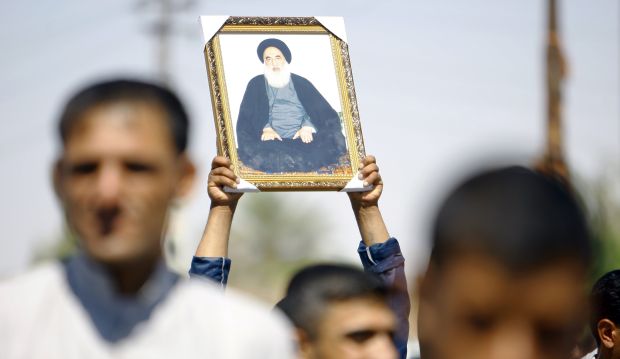
An Iraqi man holds up a portrait of Shiite cleric Grand Ayatollah Ali al-Sistani during a demonstration in the central Shiite Muslim shrine city of Najaf on June 14, 2014. (AFP/Haider Hamdani)
Baghdad, Asharq Al-Awsat—Iraq’s top Shi’ite cleric called on the country’s political players to overcome their sectarian and ethnic differences and work together to form a new government, with Prime Minister-designate Haider Al-Abadi facing the increasingly difficult task of uniting the divided political factions.
In his Friday sermon, Grand Ayatollah Ali Al-Sistani warned that political differences and bickering “could derail the formation of a new government,” urging parties and blocs to be more realistic in their demands. He called on Iraq’s leaders to resolve their differences in a “realistic and feasible” manner and form a new government as swiftly as possible.
Abadi has until September 10 to form a new government. However, Iraq’s Sunni and Kurdish political figures are calling on the prime minister-designate to offer “guarantees” before they will agree to join a national unity government.
In comments to Asharq Al-Awsat, senior Democratic Civil Alliance figure Mithal Al-Alusi said Abadi was facing a tough task in forming a new government before the end of the deadline.
“The problem that Abadi is facing is based on the fact that the political blocs do not intend to overcome their sectarian loyalties. Therefore, I do not expect a real breakthrough to happen so long as this mentality remains prevalent,” he said.
Alusi, a leading Sunni political figure in Iraq, added that his party was also facing difficulty in setting aside its sectarian interests. He added that the Alliance was currently in the process of producing a petition calling for the abolition of Iraq’s sectarian and ethnic quota-based political system. Since Saddam’s ouster, Iraq’s president has always been a Kurd, the prime minister a Shi’ite, and the speaker of parliament a Sunni.
As for whether the Democratic Civil Alliance was seeking a ministerial portfolio in the Abadi government, Alusi told Asharq Al-Awsat: “For us, it is not a matter of obtaining a ministerial portfolio, but how we can serve the people through any such position.”
Mohamed Al-Khalidi of the Sunni-led Iraqi Forces Alliance affirmed that Abadi—a Shi’ite and member of Maliki’s State of Law coalition—will have a tough time convincing Iraq’s Sunnis, who felt disenfranchised by the outgoing prime minister.
He said: “Sunni blocs have stressed from the outset that they are not interested in participating in the government as much as being partners in the political decision-making.”
“What happened over the past three years has been the result of the policies of marginalization and exclusion,” Khalidi said in reference to former prime minister Nuri Al-Maliki.
“There must be partnership in decision-making or we will withdraw from the political process,” he warned.
Abadi may have an easier time convincing Iraq’s Kurds, who this week rejoined the cabinet and are seeking more support from Baghdad to combat advancing Islamic State of Iraq and Syria (ISIS) fighters.
In comments to Asharq Al-Awsat, Kurdistan Alliance MP Farhad Hassan said: “Kurds have rights not demands,” in response to Sistani’s comments.
“If these demands, which are constitutional, are considered to be unrealistic, how can one abide by the constitution then?” he asked.
